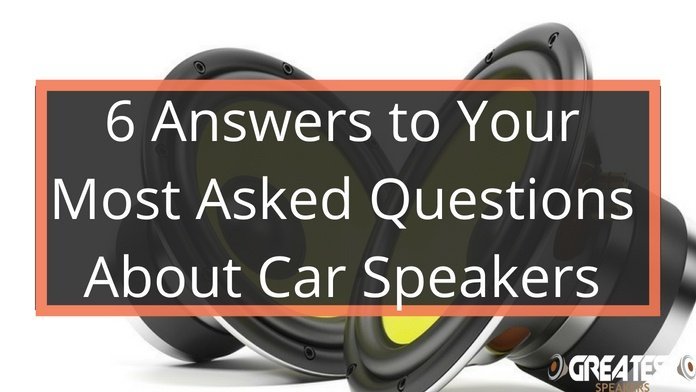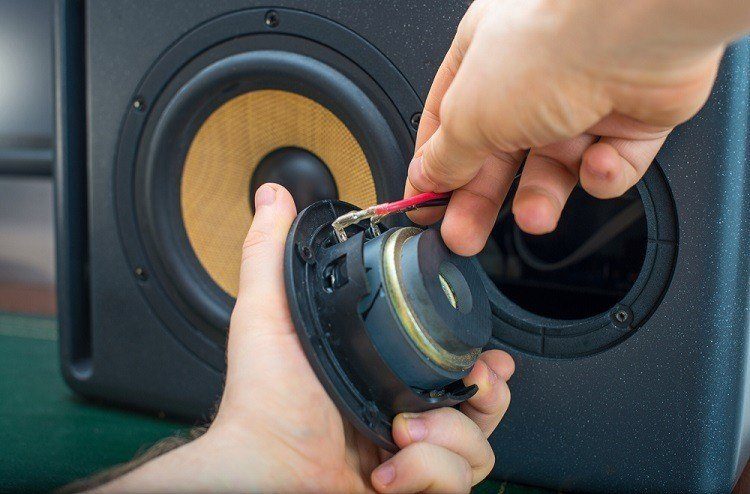6 Answers to Your Most Asked Questions About Car Speakers
I guess it doesn’t come as a surprise to you that we are getting many questions about car speakers and car sound in general. Often, there are questions like “which car speaker should I buy?” or “Is that subwoofer better than this?”. These are questions that we have already answered in our buying guides, that’s why we make them. However, we also get some questions that we are tired of answering over and over… So, here they are!
Answered to Your Most Asked Questions About Car Speakers
How Can I Play Music from My Phone to My Car?
If your head unit does not support modern connectivity options like Bluetooth or micro-USB, you have several alternatives to connect your cell phone. They include:
An FM Transmitter: this is probably the cheapest and easiest option. It is a simple plug-and-play tool that connects your phone to the car stereo using good old radio signals. If you have a regular headphone jack on your phone, you can select a transmitter that plugs into it. For newer iPhone users, Bluetooth based FM transmitters are also available.
A Car Adapter: This may be a better option if you don’t mind taking out the head unit. This device connects to the CD-changer output at the back of the head unit. Of course, for that to work, you need to figure out if your car head unit does have this feature at the back. There are different adapters out there, with connectivity support ranging from simple USB and Aux, to even Bluetooth and SD cards.
If these two options don’t work, then, unfortunately, the only recourse may be to change your car head unit. It is expensive and complicated, but well worth the trouble if you want advanced connectivity in your car. If you want to learn more about this, we have a dedicated post on this subject which you can find here.
What are Dual Car Speakers?
The term you are referring to is probably “dual cone speakers.” These are very cheap budget speaker options. As the name suggests, you get two paper cones on a speaker instead of one cone. The larger standard cone may not be good at producing high-frequency sounds. So you add a smaller cone to try and improve the sound quality. You may get slightly better bass output, but on the downside, at higher volumes, you will get distortions pretty quickly.
Dual cone speakers are far from the best at reproducing sounds. A better option would be coaxial speakers, which have a woofer and tweeter in the same speaker. And if money is not an issue, Component speakers are the best option regarding car audio quality.
My Car Speakers are Buzzing, Is That Normal?
This can be considered normal only if it happens when you play AM radio. The AM signals are often affected by your car ignition systems. Check the shielding and insulating system of your radio. If the buzzing is persistent even when AM radio is off, it is either a physical or an electrical issue.
Any electrical activity can potentially interfere with speakers. So check if any other item, like a phone, is being charged inside your car while this issue occurs. Another simple reason might be a loose and vibrating speaker. Check them to ensure that they are securely housed in the car body.
Try changing the engine speeds while the speakers are buzzing. If the rate of fuzz changes with the engine output, then the issue is with your electrical system. Some component in the electricals is interfering with your car stereo electronics. Possible issues could be a stray wire that is loose or failing component like an alternator or fan. A reliable way to confirm this would be to turn off all systems except for the speakers. If the sounds disappear, you need to check the electricals inside your car.
New Speakers Sound Distorted, are They Broken?
Distortions can happen due to several reasons. First, rule out the simplest cause: check the audio inputs. If it is a radio, or from an MP3 player/cell phone, check the source first. Ensure that the source volume is high before cranking your speaker volume levels. Also turn off all equalizer settings, if any are active.
If it persists, check the wirings. Since this is a new system, it could be due to a faulty or poorly executed installation. Look at all the connections. Use quality components, be it the wires or connectors for best results.
Another common cause is the lack of juice from a car head unit. Many units just don’t have the wattage capacity to run speakers at full tilt. This is where amps enter the picture. Even the addition of a small 2-channel amplifier can drastically improve speaker performance. Of course, this is assuming that you don’t already have amps!
What’s the Difference Between 2 and 4 Ohms?
We have already covered the difference between 2 and 4 ohms in this article, but it is worth mentioning again. Ohms refers to the electrical resistance/impedance in an electric circuit, which includes audio systems. Car audio usually has 2 or 4-ohm ratings. The actual difference in performance between a 2-ohm and 4-ohm speaker will be minimal if all other settings are the same.
A speaker with higher impedance rating will be bigger, with more wiring in the voice coils. This will result in a slight difference in weight, as well as the minor difference in audio quality and loudness. Less resistance means more sound, so a 2-ohm speaker should be louder. But it also consumes more power and usually results in less quality.
At 4 ohms, the higher electrical impedance results in less sound output. But that output is compact and of a better quality. It also uses less power. But the difference regarding audio output between 2 ohms and 4 ohms subwoofers may not be very easy to identify unless you are an expert audiophile.
Burning Smell After Installation of New Car Speakers, Is That Normal?
Honestly, this depends a lot on the kind of smell! Most factory-made machines tend to have an initial run-in period, like in a car or motorcycle. This is also true for audio equipment. During this initial hours or days, it is not unusual for speakers to emit a mild chemical smell. This is usually due to the evaporation of extra glue inside.
During this run-in period, it is essential not to crank the volume up to max from the get-go. This can result in what is called “clipping”. The voice coil can get heated up, resulting in a slight burning smell. Take it too far, and your coil will burn up. This is bad and can ruin the speakers for good.
Last Updated on November 4, 2023 by Brian Beasley



